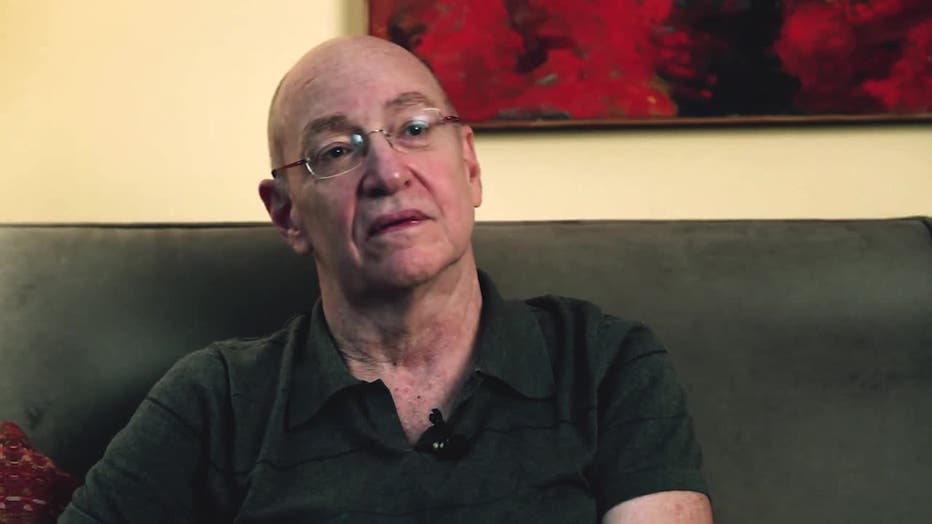End-of-life options: Exploring the 'Death with Dignity' debate for the terminally ill
NEW YORK - Youssef Cohen’s dying wish was to die with dignity, surrounded by love, and above all, without needless suffering.
"The way things are shaping up to be a painful difficult death, I would give up everything I love to have a decent death, for myself and those that love me," Cohen said.
It was a simple request, but one not available in New York. Not now, and not when Cohen took his last breath in Oregon in 2016.

Yousef Cohen took his last breath in Oregon back in 2016.
He made a video for the advocacy group, Compassion and Choices, one week before he passed.
"I love life. I don’t think of it as suicide. You’re going to die anyhow, so I think of it as choosing how you want to die," Cohen said in the video. "This seems to me to be a much more humane way of dying."
Cohen was diagnosed with mesothelioma, a cancer of the lungs, back in 2012.
At first, Cohen, his family and medical team were optimistic that he could live comfortably. But when the chemotherapy, the radiation and the surgeries failed to stop his illness, hope quickly faded.

When the chemotherapy, radiation, and surgeries failed to stop his illness, hope quickly faded.
"When that wasn't enough and the cancer had taken over his body, and as he knew that that was happening, he became very convinced and serious about wanting to end his life on his own terms," recalled Cohen’s wife, Lindsay Wright. "My husband knew that there was not going to be a positive outcome, that he was going to die, and so that's when he really started researching his options."
"He even looked at Dignitas in Switzerland and considered flying to Switzerland so that he could take medication there and his life in his own terms. Then we learned about this ‘medical aid in dying’ in Oregon that had been established for two decades, and that's what we thought was going to be our best option."
What states have ‘Death With Dignity’?
In 1997, Oregon became the first state in the nation to legalize "medical aid in dying" or as some refer call it, assisted suicide.
Currently, 10 states and Washington D.C. have legalized what they call "Death With Dignity."
RELATED: Medical aid in dying: States debate right-to-die laws
How does the process work?

If the patient follows the strict set of rules, they can obtain a powdered medication that is mixed in water and consumed.
In order to die on your own terms, the terminally ill patient must:
- Move to a state with the laws in place
- Establish residency
- Find a physician willing to help
- Make a formal request in writing
- Wait two weeks
- Request the medication again
If the patient follows the strict set of rules, they can obtain a powdered medication that is mixed in water and consumed, without the help or assistance of anyone but the terminally ill patient.
"I didn't know anybody in Oregon," Wright said. "You know, we were putting our hands into medical personnel who might or might not help us. You know, it was a, it was a roll of the dice, you know, really to get there."
"His illness deteriorated so quickly, his body deteriorated so quickly, and I think that is the most difficult aspect of this,sort of. It's almost impossible to move to another state."
It is a decision Cassandra Johnston is contemplating as she battles stage three breast cancer.

Cassandra Johnston is contemplating the decision as she battles stage three breast cancer.
"My cancer diagnosis was fairly unexpected. I had no symptoms, nothing that would be cause for alarm," Johnston said. "One day I accidentally discovered a lump on my right side, so being diagnosed with late-stage cancer, it is very scary because you hear all of the terrible stories from friends and family who have had firsthand experience with their loved ones, who have died truly in agony. A lot of trauma, a lot of pain, a lot of needless suffering."
"And I thought for one, I would never wish that on anybody, including myself. I would not wish upon myself to suffer needlessly. When there is a peaceful and compassionate option for people who are terminally ill. So when you think about all that trauma and pain that could be at the end of life, it's such a peace of mind to know that it doesn't have to be that way."
Johnston has become an advocate for Compassion and Choices and a proponent of medical aid in dying.
The closest option for medical aid in dying is Vermont, which just removed the residency requirement, and New Jersey, which has not.

The closest option for medical aid in dying is Vermont.
New York’s legislature is considering legalizing medical aid in dying, but the bill has been stalled for the last eight years.
It is an issue with its fair share of critics, including those who believe it will be exploited by insurance companies and doctors who will refuse to treat patients with terminal or potentially terminal diagnoses.
Dignitas, whose motto is "to live with dignity and die with dignity," has been advocating for years. The group is based in Switzerland. They are leading the charge in Europe.
"Most of our members come from Europe, mainly Germany, Great Britain and France. But still around 10% of our members are from the U.S.," Sylvan Luley said.

Dignitas is based in Switzerland. They are leading the charge in Europe.
In some European countries, such as England, it’s a crime, akin to voluntary murder, not only for the patient, but for their surviving family members.
"We have never seen anyone that wants to die," Luley said. "Not even the people that turned to Dignitas want to die. They don't want to continue living in a situation that they personally find to be unbearable suffering, that they have a situation that they have which impairs their quality of life to the point that they do not want to continue, and that's a big difference in because if you could alleviate that suffering in one way or another, these people would certainly, thankfully, carry on living."
And so, the debate continues. In a country like the U.S. where we value the ability to live freely, what happens at the point in which we want to die on our own terms?
"I do feel that his death was more compassionate, more gentle," Wright added. "He went to sleep. He did not suffer in the end."


